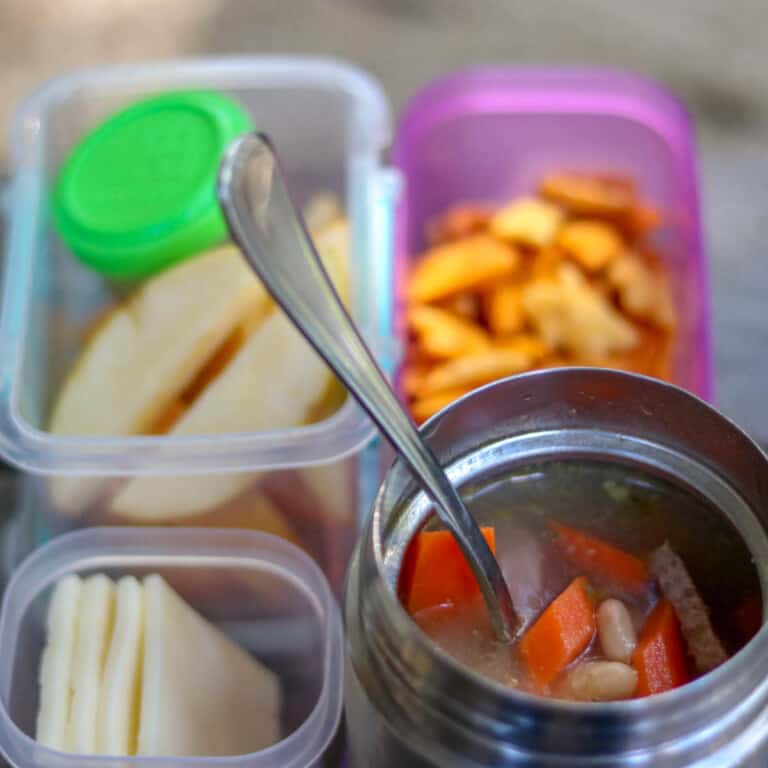For many years, I’ve had the uncommon opinion that children should not be packing their own lunches. This is based on using Satter’s Division of Responsibility of Feeding in my home and in my clinical work. The parents’ job is to decide “the what,” and, to me, this means “what” is packed in the lunch box. Also, this recommendation is based on my clinical experience of working with tweens and teens who have been given a lot of responsibility a little too early with their eating and other self-care tasks.

There are so many messages in our culture that to be “good parents,” we need to make sure that our children are self-reliant and independent. Often, I am coaching parents to have more support around feeding so that their children can be successful in caring for themselves with food. Children are constantly learning how to take care of themselves, and if we give them all of their parents’ jobs too soon, they may not have the foundation to be successful.
Don’t Children Need to Be Independent?
When I say to the parents of my clients or to my friends that I don’t think children need to be packing lunches, I’m often met with surprise:
“Shouldn’t we be teaching our children to take responsibility?”
“Don’t we need to NOT do everything for our children?”
“They need to learn to do some of the chores.”
Yes, I agree with these suggestions, but I also think we need to do it in an intentional way, especially with food. We need to take the training wheels off slowly and not just hand them the parent’s jobs because we think they “should” do this task on our list.

Previously, I wrote about Feeding Teens: Slowly Taking Down the Scaffolding. As parents, our goal is to raise competent eaters — adults that can eat a variety of foods, in different situations, and listen to their body’s cues. We don’t need to achieve this overnight, and this work takes years of modeling and providing supportive structure. Read more about “scaffolding” or the support we offer children so they can learn and grow in my previous post.
Tweens & Teens CAN Help Pack Lunches
Over the last few years, my own husband has asked me, “When can we get the kids to help with packing lunches?” And I’ve responded, “That is the parents’ job.” Well, even a dietitian (that’s me!) who does this work as a living, needs a little nudging and reminder with their own children. I needed to be reminded that I have a 13 year old and almost 10 year old and they CAN assist with packing lunches. It doesn’t have to mean I abandon any modeling or support. So, we have shifted and they are helping with the lunches.
Love this post and want to save it for later?
Just fill in your email address below, click “Save It” and get it delivered right to your inbox.

Tips to have your tween or teen’s help with lunch packing:
- Give them age-appropriate “chores.”
- “Make sure your lunch boxes are emptied and on the counter for us to re-pack.”
- Pack lunches together.
- “Hey, Isaac, can you please help me get lunches packed?’
- Give them specific tasks.
- “Will you please put grapes in two small containers?”
- You make the entree and guide them through the sides.
- “I’m going to make sandwiches. Can you please pick out a chip bag, fruit, and yogurt?” (Depending on the age, you may need to ask them one at a time.)
- Plan your lunches (or write down a quick list for the lunch at hand) and have them use this as a guide.
- “The plan for lunch tomorrow is here, can you please start with putting the sides in the lunchboxes?”
- Check out our new Lunch Packing e-book for more information on planning lunches. (Click the link here if you’d like to purchase the e-book).
- Let them have some input. (especially teens)
- “I’m heating up beans and rice for your thermos, what else do you want in your lunch box?” “Ok, let’s also put an apple in there.”

With Tweens & Teens (and all children), Avoid Saying:
- “You HAVE to have a fruit in your lunch.”
- “Your lunch HAS to include X, Y, and Z.
- “That lunch is full of junk.”
- “You need to put some healthy food in your lunchbox.”
These statements can enter you into a tug of war about food with your child. Instead, we can model day in and day out what foods make up a balanced lunch. I also avoid having them making all of the decisions and then telling them it’s wrong. If I took all the scaffolding down and said, “You need to make your lunch.” They may not be ready to put together a balanced lunch. Instead, I can take down some of the scaffolding, but support them with a structure.
“Can you please pick out a fruit and yogurt to add to your lunch while I heat up the leftover spaghetti and meatballs?”
Would you like some help with lunch packing for all ages? Check out our new Lunch Packing E-book! In this new e-book, we are sharing our lunch packing formula that makes lunch packing simple and less of a chore!

We’re Elizabeth & Anna!
It’s great to have you here. We’re registered dietitians and we share tips to support you in raising kids with a healthy relationship with food.





